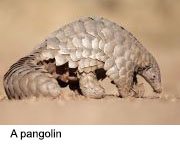FRIDAY, May 8, 2020 (HealthDay News) — They’re small spiny mammals that look like anteaters with scales.
And pangolins — which some credit with playing a role in the emergence of the new coronavirus — might hold clues to fighting COVID-19.
Genetic research into the new coronavirus has suggested that it originated in bats, found its way into pangolins sold at Chinese “wet markets,” and then migrated into humans.
So why doesn’t the virus sicken and kill pangolins?
In a new study, researchers at the Medical University of Vienna in Austria analyzed the genomic blueprint of pangolins and compared it to other mammals including humans, cats, dogs and cattle.
In most mammals, certain genes detect when a virus enters the body, triggering an immune response against the invader.
But pangolins lack two of these virus-sensing genes, the research team reported in the May 8 issue of the journal Frontiers in Immunology. Whether or not that difference shields the creatures from COVID-19 isn’t known, but warrants further investigation.
The Austrian scientists believe their findings are important because it means that while pangolins can be carriers of the new coronavirus, they may have ways to keep its nastier effects at bay.
Learning more about this evolutionary advantage in pangolins may suggest possible treatments for coronavirus in humans, the team said.
“Our work shows that pangolins have survived through millions of years of evolution without a type of antiviral defense that is used by all other mammals,” study co-author Dr. Leopold Eckhart said in a journal news release.
“Further studies of pangolins will uncover how they manage to survive viral infections, and this might help to devise new treatment strategies for people with viral infections,” Eckhart added.
In humans, the new coronavirus can cause an inflammatory immune response called a cytokine storm, which results in more severe illness.
An overactivated immune system can be moderated, however, “by reducing the intensity or by changing the timing of the defense reaction,” Eckhart said.
Drugs that suppress gene signaling might therefore be a possible treatment option for severe cases of COVID-19, Eckhart said. But there’s a hitch: Any immune-suppressing drug could make patients more vulnerable to other infections.
So, “the main challenge is to reduce the response to the pathogen while maintaining sufficient control of the virus,” Eckhart said.
More information
The U.S. Centers for Disease Control and Prevention has more on COVID-19.
Copyright © 2026 HealthDay. All rights reserved.

